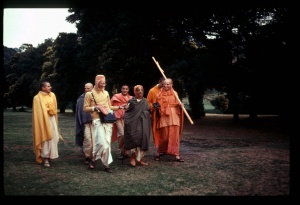CC Adi 17.178-179 (1975): Difference between revisions
(Vanibot #0027: CCMirror - Mirror CC's 1996 edition to form a basis for 1975) |
(Vanibot #0020: VersionCompareLinker - added a link to the Version Compare feature) |
||
| Line 2: | Line 2: | ||
<div style="float:left">'''[[Sri Caitanya-caritamrta (1975)|Śrī Caitanya-caritāmṛta (1975)]] - [[CC Adi (1975)|Ādi-līlā]] - [[CC Adi 17 (1975)|Chapter 17: The Pastimes of Lord Caitanya Mahāprabhu in His Youth]]'''</div> | <div style="float:left">'''[[Sri Caitanya-caritamrta (1975)|Śrī Caitanya-caritāmṛta (1975)]] - [[CC Adi (1975)|Ādi-līlā]] - [[CC Adi 17 (1975)|Chapter 17: The Pastimes of Lord Caitanya Mahāprabhu in His Youth]]'''</div> | ||
<div style="float:right">[[File:Go-previous.png|link=CC Adi 17.177 (1975)|Ādi-līlā 17.177]] '''[[CC Adi 17.177 (1975)|Ādi-līlā 17.177]] - [[CC Adi 17.180 (1975)|Ādi-līlā 17.180]]''' [[File:Go-next.png|link=CC Adi 17.180 (1975)|Ādi-līlā 17.180]]</div> | <div style="float:right">[[File:Go-previous.png|link=CC Adi 17.177 (1975)|Ādi-līlā 17.177]] '''[[CC Adi 17.177 (1975)|Ādi-līlā 17.177]] - [[CC Adi 17.180 (1975)|Ādi-līlā 17.180]]''' [[File:Go-next.png|link=CC Adi 17.180 (1975)|Ādi-līlā 17.180]]</div> | ||
{{CompareVersions|CC|Adi 17.178-179|CC 1975|CC 1996}} | |||
{{RandomImage}} | {{RandomImage}} | ||
| Line 8: | Line 9: | ||
<div class="verse"> | <div class="verse"> | ||
:kājī kahe, | :kājī kahe,--yabe āmi hindura ghare giyā | ||
:kīrtana kariluṅ mānā mṛdaṅga bhāṅgiyā | :kīrtana kariluṅ mānā mṛdaṅga bhāṅgiyā | ||
:sei rātre eka siṁha mahā-bhayaṅkara | :sei rātre eka siṁha mahā-bhayaṅkara | ||
| Line 18: | Line 19: | ||
<div class="synonyms"> | <div class="synonyms"> | ||
kājī kahe—the Kazi replied; yabe—when; āmi—I; hindura—of a Hindu; ghare—in the house; giyā—going there; kīrtana—chanting of the holy name; kariluṅ—made; mānā—prohibition; mṛdaṅga—the drum; bhāṅgiyā—breaking; sei rātre—on that night; eka—one; siṁha—lion; mahā-bhayaṅ-kara—very fearful; nara-deha—having a body like a human | kājī kahe—the Kazi replied; yabe—when; āmi—I; hindura—of a Hindu; ghare—in the house; giyā—going there; kīrtana—chanting of the holy name; kariluṅ—made; mānā—prohibition; mṛdaṅga—the drum; bhāṅgiyā—breaking; sei rātre—on that night; eka—one; siṁha—lion; mahā-bhayaṅ-kara—very fearful; nara-deha—having a body like a human being's; siṁha-mukha—having a face like a lion's; garjaye—was roaring; vistara—very loudly. | ||
</div> | </div> | ||
| Line 25: | Line 26: | ||
<div class="translation"> | <div class="translation"> | ||
The Kazi said, | The Kazi said, "When I went to the Hindu's house, broke the drum and forbade the performance of congregational chanting, in my dreams that very night I saw a greatly fearful lion, roaring very loudly, His body like a human being's and His face like a lion's. | ||
</div> | </div> | ||
Latest revision as of 16:09, 26 January 2020

A.C. Bhaktivedanta Swami Prabhupada
TEXTS 178-179
- kājī kahe,--yabe āmi hindura ghare giyā
- kīrtana kariluṅ mānā mṛdaṅga bhāṅgiyā
- sei rātre eka siṁha mahā-bhayaṅkara
- nara-deha, siṁha-mukha, garjaye vistara
SYNONYMS
kājī kahe—the Kazi replied; yabe—when; āmi—I; hindura—of a Hindu; ghare—in the house; giyā—going there; kīrtana—chanting of the holy name; kariluṅ—made; mānā—prohibition; mṛdaṅga—the drum; bhāṅgiyā—breaking; sei rātre—on that night; eka—one; siṁha—lion; mahā-bhayaṅ-kara—very fearful; nara-deha—having a body like a human being's; siṁha-mukha—having a face like a lion's; garjaye—was roaring; vistara—very loudly.
TRANSLATION
The Kazi said, "When I went to the Hindu's house, broke the drum and forbade the performance of congregational chanting, in my dreams that very night I saw a greatly fearful lion, roaring very loudly, His body like a human being's and His face like a lion's.